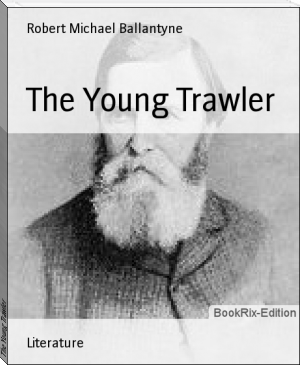The Young Trawler - Robert Michael Ballantyne (large screen ebook reader txt) 📗

- Author: Robert Michael Ballantyne
Book online «The Young Trawler - Robert Michael Ballantyne (large screen ebook reader txt) 📗». Author Robert Michael Ballantyne
CHAPTER FOUR.
BILLY BRIGHT THE FISHER-BOY VISITS LONDON--HAS A FIGHT--ENLARGES HIS MIND, AND UNDERTAKES BUSINESS.
We must now return to the _Evening Star_ fishing-smack, but only for a few minutes at present. Later on we shall have occasion to visit her under stirring circumstances. We saw her last heading eastward to her fishing-ground in the North Sea. We present her now, after a two months' trip, sailing to the west, homeward bound.
Eight weeks at sea; nine days on shore, is the unvarying routine of the North Sea smacksman's life, summer and winter, all the year round. Two months of toil and exposure of the severest kind, fair-weather or foul, and little more than one week of repose in the bosom of his family-- varied by visits more or less frequent to the tap-room of the public-house. It is a rugged life to body and soul. Severest toil and little rest for the one; strong temptation and little refreshment to the other.
"Strong temptation!" you exclaim, "what! out on the heaving billows and among the howling gales of winter on the North Sea?"
Ay, stronger temptation than you might suppose, as, in the sequel, you shall see.
But we are homeward bound just now. One of the gales above referred to is blowing itself out and the _Evening Star_ is threading her way among the shoals to her brief repose in Yarmouth.
The crew are standing about the deck looking eagerly towards the land, and little Billy is steering. [See Frontispiece.]
Yes, that ridiculous atom of humanity, with a rope, or "steering lanyard," round the tiller to prevent its knocking him down or sweeping him overboard, stands there guiding the plunging smack on her course through the dangerous shoals. Of course Billy's father has an eye on him, but he does not require to say more than an occasional word at long intervals.
Need we observe that our little hero is no longer subject to the demon which felled him at starting, and made his rosy face so pale? One glance at the healthy brown cheeks will settle that question. Another glance at his costume will suffice to explain, without words, much of Billy's life during the past eight weeks. The sou'-wester is crushed and soiled, the coat is limp, rent, mended, button-bereaved more or less, and bespattered, and the boots wear the aspect of having seen service. The little hands too, which even while ashore were not particularly white, now bear traces of having had much to do with tar, and grease, and fishy substances, besides being red with cold, swelled with sundry bruises, and seamed with several scars--for Billy is reckless by nature, and it takes time and much experience of suffering to teach a man how to take care of his hands in the fisheries of the North Sea!
An hour or two more sufficed to carry our smack into port, and then the various members of the crew hurried home.
Billy swaggered beside his father and tried to look manly until he reached his own door, where all thought of personal appearance suddenly vanished, and he leaped with an unmanly squeal of delight into his mother's arms. You may be sure that those arms did not spare him!
"You'll not go down to-night, David?" said Mrs Bright, when, having half choked her son, she turned to her husband.
"No, lass,--I won't," said the skipper in a tone of decision.
Mrs Bright was much gratified by the promise, for well did she know, from bitter experience, that if her David went down to meet his comrades at the public-house on his arrival, his brief holidays would probably be spent in a state of semi-intoxication. Indeed, even with this promise she knew that much of his time, and a good deal of his hardly earned money, would be devoted to the publican.
"We'll not have much of Billy's company this week, I fear," said Mrs Bright, with a glance of pride at her son, who returned it with a look of surprise.
"Why so, Nell?" asked her husband.
"Because he has got to go to London."
"To Lun'on!" exclaimed the father.
"Lun'on!" echoed the son.
"Yes; it seems that Miss Ruth--that dear young lady, Miss Ruth Dotropy-- you remember her, Billy?"
"Remember her! I should think I does," said the boy, emphatically, "if I was to live as long as Meethusilim I'd never forget Miss Dotropy."
"Well," continued Mrs Bright, "she wrote and asked Joe Davidson's wife to send her a fisher-boy to London for a day or two, and she'd pay his railway fare up an' back, and all his expenses. What ever Miss Ruth wants to do with him I don't know, nor any one else. Mrs Davidson couldn't find a boy that was fit to send, so she said she'd wait till you came back, Billy, and send _you_ up."
"Well, wonders ain't a-goin' to cease yet a while," exclaimed Billy, with a look of gratified pride. "Hows'ever, I'm game for anythink--from pitch an' toss up'ards. When am I to start, mother?"
"To-morrow, by the first train."
"All right--an' what sort o' rig? I couldn't go in them 'ere slops, you know. It wouldn't give 'em a k'rect idear o' Yarmouth boys, would it?"
"Of course not sonny, an I've got ready your old Sunday coat, it ain't too small for you yet--an' some other things."
Accordingly, rigged out, as he expressed it, in a well-mended and brushed pilot-cloth coat; a round blue-cloth cap; a pair of trousers to match, and a pair of new shoes, Billy found himself speeding towards the great city with what he styled "a stiff breakfast under hatches, four or five shillings in the locker, an' a bu'stin' heart beneath his veskit."
In a few hours he found himself in the bewildering streets, inquiring his way to the great square in the West End where Mrs Dotropy dwelt.
The first person of whom he made inquiry was a street boy, and, while he was speaking, the city Arab regarded the provincial boy's innocent face--for it was a peculiarly innocent face when in repose--with a look of mingled curiosity and cunning.
"Now look 'ee here, young 'un," said the Arab, "I don't know nothink about the Vest End squares, an' what's more I don't want to, but I do know a lot about the East End streets, an' if you'll come with me, I'll--"
"Thank 'ee, no," interrupted Billy, with unlooked-for decision, "I've got business to look arter at the _West_ End."
"Yell, cooriously enough," returned the Arab, "I've got business at the _East_ End. By the vay, you don't 'appen to 'ave any browns--any coppers--about you--eh?"
"Of course I has. You don't suppose a man goes cruisin' about Lun'on without any shot in the locker, do you?"
"To be sure not," responded the street boy; "I might 'ave know'd that a man like you wouldn't, anyhow. Now, it so 'appens that I'm wery much in want o' change. You couldn't give me browns for a sixpence, could you?"
The Arab said this so earnestly--at the same time producing a sixpence, or something that looked like one, from his pockets--that the provincial boy's rising suspicions were quite disarmed.
"Let me see," he said, plunging his hand into his trousers pocket--"one, two, three--no, I've only got fourpence, but--"
He was cut short by the Arab making a sudden grasp at the coins, which sent most of them spinning on the pavement.
Like lightning little Billy sprang forward and planted his right fist on the point of the Arab's nose with such vigour that the blow caused him to stagger backwards. Before he could recover Billy followed him up with a left-hander on the forehead and a right-hander on the chest, which last sent him over on his back. So sudden was the onset that the passers-by scarcely understood what was occurring before it was all over. A grave policeman stepped forward at the moment. The Arab rose, glided into a whirl of wheels and horses' legs, and disappeared, while Billy stood still with doubled fists glaring defiance.
"Now then, my boy, what's all this about?" said the man in blue, placing a large hand gently on the small shoulder.
"He's bin and knocked my coppers about," said our little hero indignantly, as he looked up, but the stern yet kindly smile on the policeman's face restored him, and he condescended on a fuller explanation as he proceeded to pick up his pence.
Having been cautioned about the danger of entering into conversation with strangers in London--especially with street boys--Billy was directed to a Pimlico omnibus, and deposited not far from his destination. Inquiring his way thereafter of several policemen--who were, as he afterwards related to admiring friends, as thick in London as bloaters in Yarmouth--he found himself in front of the Dotropy residence.
"Yes, my little man," said the footman who opened the door of the West End mansion, "Miss Ruth is at 'ome, and 'as been expecting you. Come this way."
That footman lost ground in Billy's estimation because of using the word _little_. If he had said "my boy," it would have been all right; "my man" would have been gratifying; but "my little man" was repulsive. A smart servant girl who chanced to see him on his way to the library also caused him much pain by whispering to her fellow something about a sweet innocent-faced darling, and he put on a savage frown, as he was ushered into the room, by way of counteracting the sweet innocence. A glass opposite suddenly revealed to its owner the smooth rosy-brown visage, screwed up in a compound expression. That expression changed so swiftly to sheer surprise, that a burst of involuntary laughter was the result. A deep flush, and silence, followed, as the urchin looked with some confusion round the room to see if he had been observed or overheard, and a sense of relief came as he found that he was alone. No one had seen or heard him except some of the Dotropy ancestors who had "come over" with the Conqueror, and who gazed sternly from the walls. For, you see, being a family of note, the dining-room could not hold all the ancestors, so that some of them had to be accommodated in the library.
That glance round had a powerful effect on the mind of the fisher-boy, so powerful indeed that all thought of self vanished, for he found himself for the first time, in a room the like of which he had never seen, or heard, or dreamed of.
He knew, of course, that there were libraries in Yarmouth, and was aware that they had something to do with books, but he had never seen a collection on a large scale, and, up to that time, had no particular curiosity about books.
Indeed, if truth must be told, Billy hated books, because the only point in regard to which he and his mother had ever differed was a book! A tattered, ragged, much-soiled book it was, with big letters at the beginning, simple arrangements of letters in the middle, and maddening compounds of them towards the end. Earnestly, patiently, lovingly, yet perseveringly, had Mrs Bright tried to drill the contents of that book into Billy's unwilling brain, but with little success, for, albeit a willing and obliging child, there was a limit to his powers of comprehension,





Comments (0)